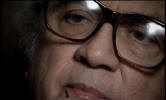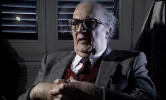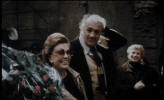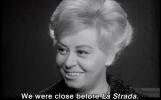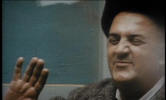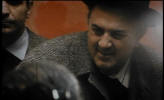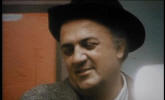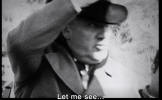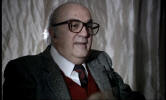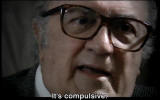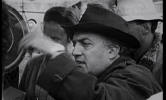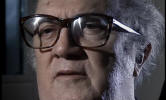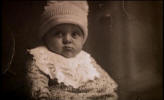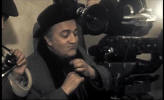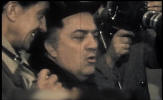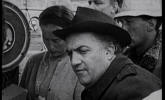|
Home A QUEST FOR THE MOST AUTHENTIC PART OF ONESELF -- FEDERICO FELLINI AUTOBIOGRAPHY |
|
by Federico Fellini, excerpted from "I'm a Big Liar," directed by Damian Pettigrew
Satyricon -- Illustrated Screenplay &
Screencap Gallery, directed by Federico Fellini "The long tale told by a creator by means of his works is a search on different levels, the search for a style, for coherence, for what is essential, an attempt to be more direct, more spontaneous, more sincere, less conceptual, to try to express oneself more fully in the most direct manner. So it's a quest for the most authentic part of oneself; hence for the self." -- Federico Fellini A Quest for the Most Authentic Part of Oneself -- Autobiography of Federico Fellini, excerpted from "I'm a Big Liar," directed by Damian Pettigrew. [LC-1]
[LC-1] If I ever see, because I never see my films again, if I see a still photo, or an excerpt from one of my films on TV, say Casanova or Satyricon, very often, I ask quite spontaneously: "Who did that?" From the moment I begin to work, when I become a filmmaker, someone takes over, a mysterious invader, an invader that I don't know, takes over the whole show. He directs everything for me. I just put my voice at his disposal, and my know-how, my attempts at being seductive, or borrowing ideas, or being authoritarian. But it's someone else, not me, with whom I co-exist, but who I don't know, or know only by hearsay. Since childhood, I was somehow attracted to characters that, in the village where I was born, were considered to be excessive, and even viewed as a bit suspect. I mean artists. I was fascinated by the fact that they didn't go to the hairdresser, could have long hair, hardly ever washed and had dirty fingernails, and no one told them off. They wore flashy clothes, and often were seen out walking with pretty girls on their arm. They ate whenever they wanted, made their own meals in their studios. And I admired them because they were thought of as scoundrels, tramps. I never thought, when I was a boy, that I'd become a film director. I was very confused. I knew I'd never be a doctor, which is what my father wanted, or a cardinal, which is what my mother wanted. I let her down. When I'm not in the studios, away from the lights, the set, where dreams and fantasies come to life, no longer having actors made up, when I've quit giving orders, once I'm no longer immersed in the atmosphere that prevails on a film set, I feel a bit empty, as if I'd been exiled. Anything could happen: I feel quite unable to cope with what they call a normal existence. What fascinated me was the feeling of rebellion. A small boy is naturally rebellious, he's reacting to the laws, the taboos, the rules laid down by his family, his school, and my generation was faced with so many taboos, those of the Catholic church, of Fascism, of politics. Memory is a mysterious element, almost indefinable, that links us to things we don't even remember having lived. But it constantly incites us to stay in contact with dimensions, with events, sensations, we can't define, but that we know actually happened. I always had a natural tendency to invent for myself a boyhood, a relationship to my family, to women, to life. I was always inventing. For me, the things that are most real are the ones I invented. For instance, my hometown. The real town of Rimini, where I grew up and went to school, has almost faded away, to give way to the Rimini, the town I described in great detail in my two films, I vitelloni or Amarcord. I now realize that those two cinematic reconstructions of a Rimini that I completely made over, are much more part of my life than the real town of Rimini, than the topographically accurate version of that small town on the Adriatic coast. Which means that I'm a big liar. How do I recognize what belongs to the most authentic part of myself? Frankly, I don't know. I seem to recognize a certain continuity in the feeling of expectation. I don't see myself as having willfully steered my life in one direction rather than another. Things happened in a very natural manner, and I went along with them, I lived them, made do with them, very naturally, as if everything had been predetermined. The same can be said of my films. I never decided to make one film rather than another. It was as if, forgive me for this rather silly comparison, as if I was a train and the stations were films. It was as if they were ripe and ready to be plucked. In a sense, as if they'd already been made. I married the right woman for someone like me. I met the friends that I needed at the appropriate moment. And today, it seems to me that I was particularly lucky, not to have opposed, or been mistaken about, to have recognized the person, who at that precise moment, really wanted to help me. And not to have had too many doubts about this opportunity for friendship, and to have put my trust in her. Even though a film is very complex to make, and requires a lot of time, it can actually exist in a sensation, in an intuition, in a premonition, it can come from a beam of light, a sound. That's a well-known debate about art, that a work of art can be foretold, announced to its creator, even through a perfume. All of life can be suggested to a lifeless creature that wants to live. It can be suggested by the trembling of a leaf. In Rashomon I saw a Japanese filmmaker who almost managed to photograph air, and by means of air, he let us glimpse into, in the walk in the forest, for instance, a man has an axe on his shoulder, the sun is reflected on the blade of the axe, casting sparkles on to the leaves. That's an example of how films can narrate in the most imaginative and most complex manner, the reality that surrounds us. Since it seems to me that directing films is really the most natural and most spontaneous means of fulfilling myself, the experience cannot be in any way unpleasant. Aside from the pleasure of creating, of inventing a world, inventing characters and situations, solving the many problems to do with technique, craftsmanship, and above all of expression, there's also a satisfaction that is deeper, more private, more brazen, that is tied to the Narcissus legend and to the idea of quasi-divine power. Which is to say that a creator always has something of Almighty God. A story-teller only speaks of, he is compelled to speak only of himself. I'm interested in and believe in everything. I find it more convenient, and mentally healthier. On the other hand, how can I be distrustful, skeptical, or too cautious in my profession? My profession reminds me constantly that I'm a magician. I get along with actors, even the most difficult ones, capricious actresses, prima donnas. I never had any problems. Above all, because I like them. I'm very fond of them. I adore their childish side, the infantile, extroverted, peacock side, their capriciousness. Psychologically, actors fascinate me. It's a collaboration. Puppets are happy to be puppets if the puppeteer is a good puppeteer. I am faithful to this ability to put myself at the service of these fantasies that I have to realize. So any picture is different than another. Any moment is completely different. So, I didn't create a system, I couldn't teach what I do. My method of work consists of being completely available, of being open. I believe that an artist, in a way, is a medium. He is only a mind, nerves, a body, hands, he's really only a vessel meant to be filled by a dream, a fantasy, an idea, a feeling, that later become characters, situations, a story. Therefore, his role is limited to making it all come into being thanks to his experience as a craftsman. He's a craftsman who's a medium. I don't think the word "improvisation" has any place in the creative process. It's a totally unsuitable word. Even an irritating one. I wouldn't use the word "improvisation," I'd use another term. I'd say what matters is being available, making oneself available, to the thing that is being born, and that is still shapeless, like molten rock, undefined. Everything later can be seen as pauses, as necessary obstacles, that enable one to make changes, to alter and improve things, that one wouldn't have thought of. At the start, for one or two weeks, I'm directing the film. Then the film starts to direct me. Films are one of the means of artistic expression that, more than any other, resembles life, requires an accuracy, it has to breathe, in its gestures and attitudes. To express a dream, a fantasy, is like advanced mathematics. It's like sending a spaceship into outer space. We need this green, no other, as in painting. A shadow must be perfectly outlined. You have to be as meticulous as life is, which appears so accidental, yet is highly precise and balanced. I feel an urge to help the grips. It's compulsive. I like to place some pictures or objects myself, some drapes. For example, the drapes, are my business, because they involve painting, and a painter can't assign another to do certain brushstrokes. Cinema is a form of painting before it is literature or drama. It's about objects, and how light falls on them. What is the most essential component of painting? What would you say? Light! An image that expresses something, that expresses an idea, a feeling, an atmosphere, a memory, and that is charged with, that tries to suggest to the spectator something that concerns not only the actor, but the spectator himself, I'd say that such an image is charged with meaning and stands for the soul of cinema. The filmmaker is better protected than other artists from contacts with his unconscious. He's protected by a ritual that he follows maybe unknowingly. I'm referring to the crew, the fact that you can turn the lighting on or off, the rehearsals, measuring the footsteps, the constant invention that goes on, in set-design or choreography. Faking things, constantly faking! Making a fake sea, a fake meadow, a fake storm. All this faking, this representation, probably unconsciously, is merely a repetition of a kind of magic, a protective ritual. My films happen because I sign a contract. I get an advance that I don't want to repay, so I have to make the film. I'll say it again, you may think I'm being facetious, but it's absolutely true. I don't believe in total creative freedom. A creator, if he is given total creative freedom, would tend, I think, to do nothing at all. The greatest danger for an artist, is total freedom. To be able to wait for inspiration, that whole romantic discourse. Psychologically, the artist is an offender. He has a childish need to offend. And to be able to offend, you need parents, a headmaster, a high-priest, the police. I need opposition, someone who annoys me, someone who opposes me, to work up the energy that I need to fight for what I'm doing. I need an enemy. In moments of deep depression, at the start of a film that I didn't want to make anymore, I dreamed that I was invited to a small hut where Picasso lived. He welcomed me, made me an omelette with twelve eggs, cooked it himself, then he told me to be seated, gave me a napkin so I wouldn't stain myself. He said to me: "Never make any stains!" Then we shared this delicious omelette. I remember that in the dream, all night long, he talked to me without stopping, as if to an old friend. It happened twice. The second time, there was no omelette! He had his back to me. In the dream, I was in the sea, and I wanted to turn back because the sea was rising and the sky darkening, it seemed to me that I'd strayed too far from the shore. Suddenly, I saw coming out of the leaden, dark and menacing waters, Picasso's bald head with its crown of white hair, his powerful shoulders, he was swimming. And I said to him: "I want to turn back!" He shook his head and said: "No, no!" And urged me to swim on. I've never felt that I was influenced or ever tried to insert a "Picassian" vision in my films. I don't think so. But Picasso, as a source of creativity, radiating strength, stimulating, urging me on, encouraging me. I don't think it's possible to define, to draw a clear dividing line, between the past, the present and the future, between something imaginary and the memory of something that really happened. I don't think that anyone who chose this profession, or who has a calling to tell stories, can distinguish it. From the moment he creates his own little universe, that creation is absolute. It's a complete universe which also includes time, not only territorial space, or the description of characters. Even time is invented. Not believing is tiring, locking oneself away, setting up roadblocks, limiting oneself. Whereas believing seems to me to belong to that vague feeling I mentioned, which for me is like a fundamental notion in which I recognize myself: expectation. Believing is also a form of expectation. I don't want to lend a mystical connotation to these statements. I mean a state of the soul, an impression in everyday life, that this feeling of expectation never leaves me. But if you ask me what I expect, I can't answer you. A woman is really the unknown planet. The part to which a man wants to be reunited, to find complementarity, to complete the circle, to find integrity, a wholeness. That's exactly why she's also the side of himself he doesn't know, the dark side. So she attracts him and frightens him. The word "fear" seems to me exaggerated. Though fear is a feeling you have to cultivate as a creator. Broadly speaking, I believe that man cannot do without fear, or being afraid. A fearless man is, I think, a fool, or a robot. Fear seems to me to be a feeling that is an inexorable part of mankind. We project on women, I think, a feeling of expectation, the revelation of something, the arrival of a message. Like that Kafka character who waited for a message from the Emperor. Woman could be the Empress who, millions of years ago, sent a message that luckily never arrived. Because I feel what makes life worth living is waiting for that message, not the message itself. The long tale told by a creator by means of his works is a search on different levels, the search for a style, for coherence, for what is essential, an attempt to be more direct, more spontaneous, more sincere, less conceptual, to try to express oneself more fully in the most direct manner. So it's a quest for the most authentic part of oneself, hence for the self. The Journey of G. Mastorna is a project that, for the last 30 years, at the completion of each of my films, has come up again, as if to say to me: "This time, it's my turn. This time, you're going to make me." I always postponed the project. But, though the story has remained untouched in all its details, the mood, the most intimate and secret part of that film, nourished and found its way into every film I made later. There's a bit of Mastorna in Satyricon, in the The City of Women, even in Casanova. Mastorna is like the wreck of a sunken ship that, from the bottom of the sea, continues to send up radioactive signals. Without taking anything away from the integrity of the project, its construction and narrative, fed all the films that followed. That's all I can say about it. I still entertain the hope of making it some day. The harshness of a certain type of experiences, undertaken without a guide, but just experienced, thanks to a natural gift, or as a result of a series of coincidences, all added up to enabling me to develop a certain kind of sensory perception which, if left uncontrolled, could lead to greatly stimulating my imagination, but also to complications with regard to my sensitivity. I think that for an artist or a creator, to be excessively conscious of how he goes about making his works isn't beneficial. An excessive knowledge of this process seems negative to me, an obstacle that may interrupt the fundamental energy, so vital and indispensable, that is called spontaneity. Spontaneity is the secret of life. The only esthetic criterion that I think is valid to judge a work of art is not to say that it's beautiful or ugly, according to certain esthetic parameters or norms established over the centuries, or according to different cultural points of view, but to know whether it is vital. It seems to me the definition that works best for me and allows me to relate to the artistic expression of an artist, of a creator, be he a painter or ... To be sure, the psychological profile of a creator, of an artist, obviously feeds on what are essentially psychological traumatisms, the injuries, the scars of its psychic existence. There's a beneficial aspect to neurosis in that it enables one to establish a depository, a warehouse, a treasure trove, from which one can draw ample resources. All fables deal with a treasure at the bottom of the ocean, or a cave guarded by monsters or dragons. You have to defeat those dragons to reach ... certainly, this danger drove important artists to identify with the aspects that are not just neurotic by psychotic of the undertaking, and they paid a heavy price for getting too close to certain truths without the protection of psychoanalysis which, at the time, had not yet become a kind of asbestos that protects us from flames, before one comes into contact with these dimensions heavily charged with magnetism. No. Personally, in this area, too, I had a lot of luck. I don't have any stigmata to show. I think it is a necessity, an interpretation of life that, probably left unto itself, would seem devoid of meaning, totally insignificant, a monstrosity. Art, on the other hand, is something that comforts us, reassures us, tells us about life in terms that are extremely protective. It makes us think about life which otherwise would only amount to a heart that beats, a stomach that digests, lungs that breathe, eyes that are filled with senseless images. I believe that art is the most successful attempt to instill in mankind the need to have a religious feeling, that's what any kind of art expresses. After a certain age, the idea of death becomes more and more present. But I'm lucky enough to be endowed with a psychological mechanism thanks to which all misfortunes, dreads, fears, debts, liabilities, all turn into ideas for stories. I believe that is the happy cynicism of a creative mind, to wit, believing that you came into this world for the unique goal of narrating it to others. An author's works can testify, as life goes by, to the different seasons, of physical decay, of old age creeping up, of the possibility of disappearing, of not being here at all, not giving any more interviews, no longer being surrounded by friends who came from afar and who waited so long. And death is something you always speak of in a literary manner. In fact, it's not at all. You can construct thousands of hypotheses, you can have read hundreds of testimonies, but I think that death is something you can never grasp. I don't have the feeling of time passing. I have the feeling that I'm stationary, on a stage, and that all the things around me are ready -- the props for the set, the paintings, the characters, the feelings, the colors -- and it's always been that way. Ever since I've led the life of a film director, it's as if time had stood still. I feel as if the day never changes, I've always been in a studio, with a megaphone in my hand, shouting, being an impostor, a clown, a police chief, a general. And sometimes, the memories of the last 40 years come back. I'm surrounded by darkness and light, darkness above and light all around, and there are these moving shadows that I have to arrange. That's how I spent my life, how it went by, and still goes on, in that image.
|
